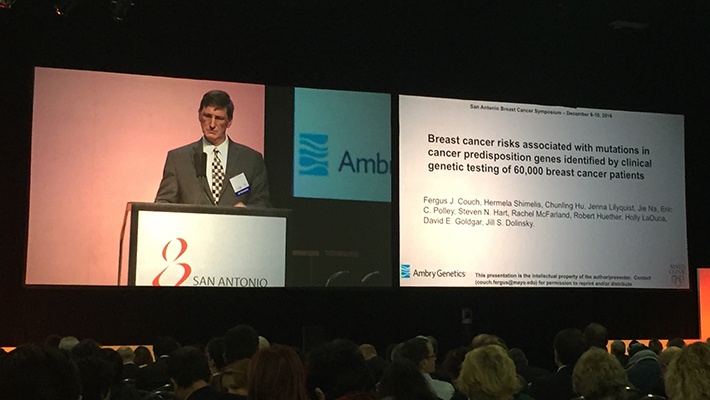
At Ambry we had the exciting opportunity to talk with Dr. Fergus Couch, Mayo Clinic Researcher, about his involvement with our Mayo Clinic research collaboration.
“Breast cancer risks associated with mutations in cancer predisposition genes identified by clinical genetic testing of 60,000 breast cancer patients,” which was the largest hereditary breast cancer patient study to date, was recently presented at the San Antonio Breast Cancer Symposium (SABCS) and has raised many different points regarding breast cancer risks associated with mutations in moderate risk genes.
For more details about this study’s findings, read our recent blog here.
While visiting Ambry, Dr. Couch discussed the research:
(Please note: Quotes have been edited for clarity and length.)
1. How will this research collaboration affect medical management guidelines for hereditary breast cancer?
It solidifies the risk estimates for certain genes, like ATM and CHEK2. It shows us that PALB2 is a high risk gene and puts it at a high risk category in the setting of the population that you are testing here at Ambry. This tends to be familial or triple negative breast cancer patients and not a population-based series. It also brings in new genes that we didn’t previously know were breast cancer genes, such as RAD51D and BARD1. They will have to be added to medical management guidelines such as those from the National Comprehensive Cancer Network.
There are also a few genes that, for the moment, are sitting on the fence. We need more numbers to really nail those down.
2. What are the benefits of this research?
It helps the patient. Right now, when the patient gets the test, and has a mutation in one of these genes, neither the patient nor the physician, in many cases, won’t know what to say about a particular mutation. For example, in the past, we would have been on the fence about a BARD1 mutation or a RAD51D mutation and what that meant. Now, we can say to the patient ‘yes it’s a moderate risk gene for breast cancer.’
For the physician and the genetic counselor, it alleviates a lot of issues they encounter every day, Now there may be more information for them to work with.
The genetics research community benefits by knowing what genes are driving breast cancer and are then able to go forward and study the phenotypes that are associated with those genes. This also includes other types of cancers, the appearance of tumors, how they behave, and the clinical outcomes from the mutations in these genes.
3. What role did Ambry’s data play in the research?
The entire study is based on Ambry’s data, none of this could be possible without Ambry’s data. As academic researchers, the cost is just too much for us to do things at this magnitude on our own. We can study maybe a few thousand patients, but there’s never enough statistical power in those types of studies.
A prime example is the RAD51D gene, which we’ve now shown to be a moderate risk breast cancer gene. Most of the papers that have been published over the last six years say it’s not associated with breast cancer. But if you look at the numbers, you’ll see the studies are based on zero out of 1,000. It doesn’t mean it’s not associated with breast cancer, it means we weren’t powered enough to study its effect on breast cancer. It’s a very different message.
4. Do you see more research looking at larger sample sizes in the future?
Absolutely. I think even now, we are limited for some of the genes. If you think about RAD51D right now, we are probably at less than 20 events, or 20 patients with mutations in those genes. It’s just very rare. Even in a testing population. We need a lot more than that to fully understand the risks.
We don’t know what to expect in many of these other cancers. We need bigger numbers. We need to be up to 300,000 or 500,000 patients. By having these huge numbers, you can really answer a lot of questions that others can’t. So, Ambry needs to stay in the research game, use the strength of their numbers, work with good collaborators and see where we can take this.
For more than 15 years, Ambry has and continues to partner with collaborators to securely share our scientific data in hopes to better understand human disease. It is our greater goal to help the scientific community achieve this understanding through AmbryShare, our recently developed anonymized data sharing program.
For more information about Ambry’s recent research and collaborations, click here.



